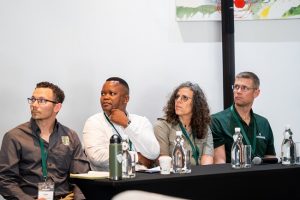Which do we value more in Africa, people, or elephants? At a recent conversation in Cape Town, Dr Jake Wall of Kenya’s Mara Elephant Project and EarthRanger, raised the question in stark and eloquent terms.

He pointed to the typical disparity in response times from the authorities between when an elephant is killed by people, and when a person is killed by an elephant.
He said that when an elephant is killed, the response time is usually measured in minutes and hours, whereas when a person is killed by an elephant, the response time is often measured in days and weeks.
Beautiful settings can inspire profound conversations. Dr Jake Wall was speaking at the annual EarthRanger User Conference in Cape Town, South Africa, where the EPI Foundation hosted a panel of experts on elephant conservation. Led by the EPI Foundation’s Greta Francesca Iori, their wide-ranging conversation was based around two crucial questions.
- What barriers prevent conservationists from working together to bring about change?
- How can technology address the gap between site-level conservation efforts and systemic challenges more effectively?
One recurring theme throughout the conversation was the need for improved communication between conservationists. Dr. Michelle Henley of Elephants Alive has spent more than 25 years working on elephant conservation, mainly in South Africa and more recently across the border in Mozambique. She emphasised the importance of breaking down the barriers that isolate organisations and stakeholders from each other.
“We need to work harder,” she argued, “to share information and knowledge beyond our immediate colleagues.”
The panellists also spoke about conservationists’ reluctance to openly discuss failure. Dr. Matt Luizza, from the United States Fish and Wildlife Service’s African Elephant Conservation Fund, said we need to understand failures as opportunities for growth and learning.
“If we can be open about the lessons from setbacks, we will build more effective strategies, avoid repeating the same old mistakes, and strengthen trust with our donors as well as affected communities,” said Dr. Luizza.
Dr. Jake Wall went on to add his views about inefficiencies and duplication. He pointed out that multiple organisations often work independently on the same issues, whereas collaboration and resource sharing lead to more significant and cost-effective impacts on the ground.
He cited Ecoscope as a platform intended to overcome this problem. Ecoscope aims to simplify and standardise reporting and analysis for users collecting data across landscapes, in the hope of producing information with wider relevance.
Indeed, the pivotal role of technology – its potential but also its limitations – was another highlight of the discussion. Dr. Wall explained how technology can mitigate human-elephant conflict, through the monitoring of elephant movements and improving response times. This real-time information, he argued, can help prevent conflicts and save lives.
However, the panellists agreed that if technology is to have a positive impact, it must be deployed in an inclusive way. Local communities must have access to tools and information that can protect them and their livelihoods. And they need to be involved in the creation of such technology if we really want to ensure its relevance to its intended beneficiaries.
Botswana’s Kaelo Nikile, Principal Wildlife Biologist at the Department of Wildlife and National Parks, stressed the importance of spatial planning that considers the ecological needs of wildlife and minimises barriers between human and elephant territories.
Dr. Wall’s example of the disparity in response times between human and elephant fatalities highlighted the issue of social inequalities and political will. Dr. Luizza emphasised that the insights and experiences of local communities are invaluable in crafting effective strategies to mitigate human-elephant conflicts. Often, their voices are overlooked in the decision-making process.
Greta Iori reiterated the EPI Foundation’s philosophy of working through partner governments, as a means of achieving capacity building and hence long-term change.
The EPI Foundation believes that part of its role is to encourage the difficult conversations that can bring progress in conservation, and hopes the discussion in Cape Town made a modest contribution in this regard.
